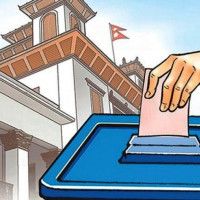- Thursday, 19 February 2026
Real estate slump costs livelihood of many, revenue loss for govt
Kathmandu, Mar. 24: Dhan Bahadur Chamling, a plumber, is greatly worried now after his business went drastically down. As the demand for underground boring was high in Koteshwor and Bhaktapur areas until three years ago, he opened a shop of goods required for underground water boring and plumbing near Sano Thimi in Bhaktapur, but now the shop has become a big financial burden for him.
"I reduced the size of my shop after failing to pay the rent, I still have to borrow money to pay the rent. After people stopped building houses, not only have I become jobless, no one visits my shop to buy goods," Chamling lamented. He further added that he was unable to pay loans he took to run the shop.
Like Chamling, many masons, painters and electricians have also been without jobs as only a small number of new houses are being built in the valley these days. Obviously, the slump in real estate business has affected many who directly or indirectly benefitted from the booming real estate business until three years ago.
Real estate business still sluggish
The real estate business, which plummeted during the period of COVID-19 pandemic, has not been revived yet and many people who were making their livelihood in the sector, mostly in private house construction, are still facing difficulties.
Due to the contraction in the economy caused by the COVID-19 pandemic and the state ban on land plotting to classify the land, real estate business was affected nationwide.
Moreover, the strict policy adopted by the Nepal Rastra Bank on real estate companies and loans for residential homes, the real estate market suffered further decline.
The NRB adopted a provision according to which 50 per cent of monthly income must be paid in installments to take a home loan ranging from Rs. 5 million to Rs. 20 million.
President of Nepal Land and Housing Developers' Federation Bhesh Raj Lohani said that the real estate business, which slowed down like other sectors after the lockdown imposed to control the spread of COVID-19, further declined because of the policy of the government and the NRB.
The introduction of the Land Use Regulation 2022, coupled with a liquidity crunch, resulted in a significant downturn in Nepal's real estate market, he said, adding that the number of property transactions plummeted significantly over the years. The government lifted the ban imposed on land plotting, stating that the ban may add further problem to the economy.
However, new policy of NRB stipulates that loans exceeding Rs. 5 million must maintain a Loan-to-Value ratio of 50 per cent. Previously, this ratio was 30 per cent within the Kathmandu Valley and 40 per cent outside.
Similarly, the loan-to-income ratio has been increased to 60 per cent for loans up to Rs. 5 million and 50 per cent for loans up to Rs. 20 million.
These provisions of the NRB are hampering the growth of the real estate business because people are not ready to buy houses even if they want to because of the problem of managing their income for EMI payments based on their income and property valuation, said Lohani.
Information Officer of Nepal Rastra Bank Dr. Dilli Ram Pokhrel said that the lending of banks and financial institutions in the real estate sector did not increase as of February of the current fiscal year.
However, the flow of personal residential home loans up to Rs. 20 million is increasing, he added.
According to the statistics of the NRB, in the first seven months of the current fiscal year, personal residential house loans from BFIs have increased by 9 per cent while such loans increased by only 2.75 per cent during the same period last year.
The outstanding loan of BFIs for personal residential house was Rs. 348 billion in July 2023 which reached Rs. 380 billion by February 2024.
However, real estate loans have decreased by 0.6 per cent during the review period. The real estate loan of banks and financial institutions was Rs. 249.44 billion in July 2023 and it fell to Rs. 247.99 billion in February 2024.
According to the statistics, the real estate market is slowing down because of the increase in repayment of real estate loans.
Dr. Pokhrel admitted that the NRB had adopted a policy of discouraging loans in the real estate sector due to the unexpected increase in real estate prices and the lack of liquidity in the banks after the COVID-19 pandemic.
However, with the improvement in the economy and increasing liquidity in the banking sector, the NRB is gradually easing the policy of lending in real estate and individual residential home loans, he said.
Construction of residential homes down by 80%
According to Sundar Khatri, an engineer and proprietor of Samar Construction, there has been a significant decline in the construction of individual homes for the last two years.
He said that his company, which designs houses, was designing 110 to 120 houses a year before COVID-19, but now it has decreased to barely one or two houses a month.
Not only the design of the houses, but also the number of houses built by his company has decreased significantly.
According to him, individual residential house construction has decreased by 80 per cent at pre cent as compared to pre COVID-19 period.
Due to the economic recession in the country, the income of people has dropped while the interest rates of banks are rising, so people are not ready to take loans to build houses, which has affected the overall construction.
Multiplier effect
The real estate industry plays a crucial role in the national economy by providing employment opportunities and contributing significantly to revenue generation.
However, there has been a sharp decline in real estate transactions, negatively impacting economic activities and government revenue, according to economist Dr. Chandra Mani Adhikari.
Various professionals, including architects, engineers, construction workers, property managers, real estate agents, and administrative staff, are employed in the real estate sector.
The decline in real estate business has implications beyond the industry; it can lead to a crisis for banks and financial institutions due to the common practice of providing loans with real estate collateral.
Dr. Adhikari emphasised the importance of viewing real estate from both economic and social perspectives. Economically, it facilitates capital formation and job creation while socially it provides quality housing at reasonable costs.
Lohani highlighted the significant impact of a downturn in the real estate market, leading to widespread job losses, increased unemployment rates, reduced consumer confidence, and spending.
"It was expected that the real estate sector accrued a transaction of around Rs. 1,500 billion yearly. The statistics of the Department of Land Management and Archives show an annual average transaction at Rs. 1,000 billion," he said.
There is a suggestion that government intervention through transparent transactions and taxation could help mitigate these issues.
The slowdown in construction has resulted in a substantial number of job losses, affecting millions of people associated with the sector and related industries such as cement, iron and brick industries.
According to cement manufacturers, the demand for cement inside the country has dropped to 8 million tonnes a year now from 10 million tonnes in 2018.
Khatri said that until COVID-19 outbreak, 26 engineers and 200 plus workers were associated with his company, but now the number has decreased and there are only two engineers and 10-12 workers.
Growing informal channels
Over the past two decades, there has been an unexpected surge in land value, largely driven by informal real estate players.
According to Lohani, only a small fraction, around 2-3 per cent, of these transactions occur through formal channels.
The absence of licensing arrangements for real estate developers and the lack of regulation like in the stock market have fueled this informal economy, resulting in inflated property prices, he said.
The proliferation of unregistered individual contractors in the real estate sector has further exacerbated informal transactions, contributing to the unnatural escalation of property prices.
Despite the need for policy interventions to organise the sector and establish regulatory bodies, the government has largely neglected this obligation, relinquishing control over the real estate business, he blamed.
The consequences of informal real estate transactions extend beyond economic distortions; the government suffers significant revenue losses, estimated at billions of rupees annually.
These losses stem from the underreporting of property values, leading to a substantial undervaluation of transactions, estimated at around Rs. 500 billion annually.
Consequently, the government is losing out on capital gains tax and registration tax revenue.
Furthermore, brokers informally involved in the real estate sector are not subject to tax because they do not show their income and do not pay taxes. This not only constitutes tax fraud but also exposes property buyers to risks of being deceived both in terms of quality and price.
Problem in financial sector
At present, many cooperative organisations in urban and rural areas are facing problems as they tend to invest most of their savings in land. This shows that financial institutions, including cooperatives, have become problematic due to their inability to manage their investment portfolios.
Looking at the state of real estate in developed and capitalist countries, as the banks and financial institutions of those countries invested more in real estate, economic recession was also seen in those capitalist countries, said economist Adhikari.
The real estate transactions skyrocketed since late 2000s after banks and financial institutions increased their investment in real estate, said economist Dr. Adhikari.
"Banks and financial institutions have given loans by securing real estate. Some have taken loans for real estate transactions. If that property is not sold, there will be problems in bank loan recovery," he said.
A similar situation is starting to appear now. Businessmen have not been able to pay their debts. Banks have started issuing auction notices to sell mortgaged properties.
Hopes of revival
Spokesperson of the Department of Land Management and Archives Bed Prasad Aryal, however, said that there has been an increase in real estate transactions and government revenue over the several months of the current fiscal year.
In the month of Falgun alone, approximately 50,998 documents were processed, including 5,699 property transfers and approval of 29 apartment documents.
This surge in transactions has resulted in significant revenue for the government, with collections of Rs. 256 million as service charge, Rs. 2.38 billion as registration fees and Rs. 1.28 billion as capital gain tax.
The transaction of land which declined by 50 per cent in the last fiscal year 2022/23 than the fiscal year 2021/22, has seen an improvement this year.
Lohani expressed his hope that the real estate business along with the construction of personal residential homes would increase with cuts in interest of bank loans and the liberal provisions of NRB to buttress this sector.
















